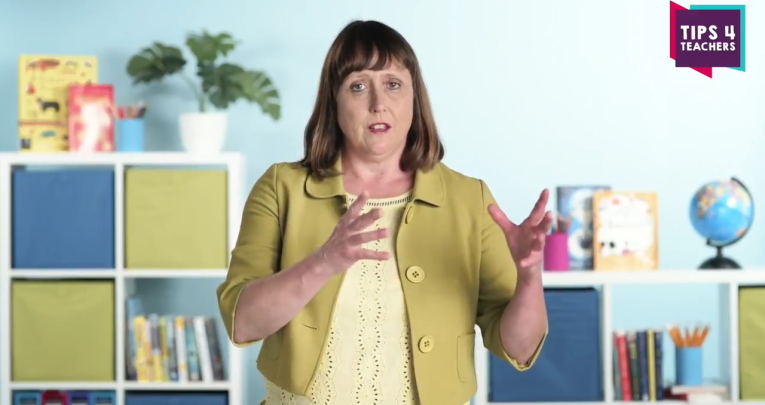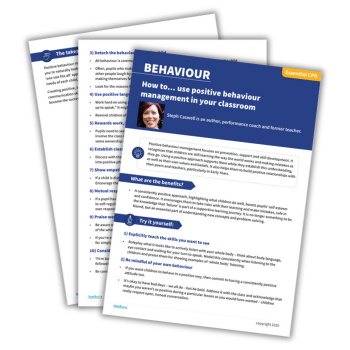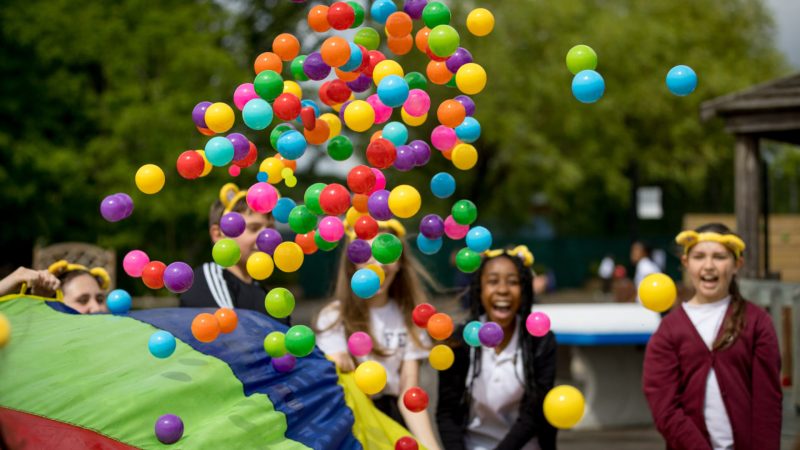Challenging behaviour – The best ways to deal with it

What do you do when the behaviour of a child in your class is very challenging? Try these behaviour management techniques…

- by Teachwire
- Classroom expertise and free resources for teachers

Want to learn how to deal with challenging behaviour in your classroom? Read on to discover the importance of consistency in behaviour management and how to deal with defiant, abusive or disruptive pupils…
Introduction to challenging behaviour
What is challenging behaviour and how big is the problem?
The NHS describes challenging behaviour as behaviour that puts students or those around them “at risk, or leads to a poorer quality of life”. It can cause teachers to lose significant amounts of teaching time each year.
NASWT published its Behaviour in Schools report in 2023, after surveying 6,586 of its members across the primary and secondary sector. The report drew a stark picture.
The top three complaints were:
- backchat/rudeness (97%)
- being sworn at (80%)
- being verbally threatened (40%)
Worryingly, in forth place, with a staggeringly high rate of 38%, was being shoved/barged. Being kicked sat at 7th place, with a rate of 11%.
While this behaviour is significantly more prevalent in secondary settings, challenging behaviour also shows up in primary schools, but it can be a little more subtle, including things like:
- Poor attendance
- Unwillingness to complete work or become involved in activities
- Being withdrawn
- Bullying
- Friendship problems
- Issues with boundaries and social behaviour
If we don’t address them, these issues can have a detrimental impact on learning and achievement.
What causes challenging behaviour?
There are lots of things that can drive really challenging behaviour, but most of the time it’s going to be about something that’s outside of the school environment.
Children may have been brought up in an atmosphere where parents use bad language around them, overreact, pay them attention for the wrong things or give them no attention at all. What you’re seeing in class is often what children have had modelled for them at home.
Another thing that can cause really challenging behaviour is adverse childhood experiences. If a child has undergone a trauma of some sort when they’re little, that can have a direct impact on both their brain and, consequently, on their behaviour.
“What you’re seeing in class is often what children have had modelled for them at home”
While the causes of challenging behaviour are, of course, as varied as the resulting behaviour, the following issues are also important to consider…
Learning difficulties
The primary years are vital in identifying children who may have additional needs. If needs go unsupported, this can lead to frustration and anger. This may manifest as aggression, withdrawal or any number of other behaviours that block learning.
Pupils with ADHD, for example, have a higher level of impulsiveness. This can lead to behaviour such as throwing items, refusing to complete a task due to frustration or ignoring instructions as a result of being too focused on something other than the lesson.
Autistic pupils often prefer familiarity and a rigid structure. Change can therefore be difficult. Non-verbal students have the challenge of not being able to easily communicate concerns.
Deprivation
Nearly a third of children in the UK are currently living in deprivation. That means that if you have 30 children in your class, nine or ten of them might be hungry, cold, lacking in sleep or wearing clothes that are worn, too small or dirty.
Poor mental health
Whether it’s a parent or a pupil with poor mental health, children’s learning will be impacted. Long waiting lists for support are exacerbating the problem, with many young people only accessing CAMHS after a serious episode.
The Covid lockdowns are still casting a long shadow, resulting in a stubborn rise in persistent absences. Anxiety is a particularly acute issue. For some, this may manifest as lashing out, rather than being shy or timid.
“The Covid lockdowns are still casting a long shadow”
Abuse
Young people who have experienced abuse and neglect often miss out on developing the vital skill of self-soothing. This is a skill we learn from adults when we are very young.
If children haven’t learnt to manage and tolerate uncomfortable feelings, these feelings can grow and become overwhelming. Sometimes this can boil over into explosive outbursts.
People who have experienced trauma sometimes believe others are hostile and not to be trusted. This means that before you’ve had a chance to build a teacher/pupil relationship, they’ll be on the defensive.
In addition, also consider temporary concerns such as tiredness, illness, issues with friends or a change in routine – be at at home or at school.
What is the cycle of challenging behaviour?
Generally, challenging behaviour follows four stages:
- trigger
- escalation
- crisis
- recovery
If you can identify triggers and spot escalating behaviour early, you can avoid reaching a crisis point. In fact, a pupil may be able to move from escalation to recovery. Over time, they’ll learn to manage the triggers themselves.
“If you can identify triggers and spot escalating behaviour early, you can avoid reaching a crisis point”
Think of it as a hill that students travel up and then down. Crisis is the summit, but if we can support students to manage their own behaviour, they will start to descend the hill before reaching the top.
Hannah Day is head of art, media and film at Ludlow College.
Behaviour management strategies for challenging behaviour
Applying flexible consistency
The question of how we differentiate for behaviour is really complex. You need to apply something called ‘flexible consistency’. This means you have a consistent set of standards that you want all children to achieve. For example, everybody listens to the teacher and each other, or everybody wears the correct uniform.
As a teacher, you understand that not all children will find it as easy to reach those standards as others. For a child who comes from a very comfortable background, getting them to sort out their uniform might be as simple as saying, “Sort your uniform out”.
For a child who has come from a really traumatic background, saying that same thing might turn into a challenging behaviour incident.
It’s about understanding that you need to be flexible in how you approach individuals, while maintaining the same high standards for all.
Dealing with defiance
When you’re dealing with a defiant or disruptive child, the first port of call is always trying to ignore that behaviour. Can you ignore it and encourage the child to control their own behaviour, rather than you constantly dealing with it?
Of course, if the challenging behaviour is dangerous, you should call straight away for help. Send another child to get a trusted adult to help you deal with the difficult situation.
Calming your class after a disruption
The aftermath of a disruptive situation can be really tricky to deal with. The first thing to do is to understand that it will impact you emotionally, so the first thing to do is to deal with your own feelings before you try and sort out the children.
It’s worth talking to children generically about why some children struggle to behave and what might cause them to kick off. Don’t refer to any individual specifically, but this will help them to understand what some of the causes of that challenging behaviour might be.
The other thing to do, of course, is to use your voice and body to calm them. Show your class that it’s OK, they’re safe now and they don’t need to worry.
Asking others for help
When you’re struggling with challenging behaviour, you need to reach out for sources of support. One of the very best sources of support for you is your SENCo.
For instance, if your SENCo knows that a child really responds to his dad being pleased with him, you can tell the child that if they do really well in the next lesson, you’ll phone their dad and tell him how great they’ve been.
Letting children know they can choose their behaviour
Self-regulation is absolutely essential. We want children to behave when we’re not in the room. One day they are going to leave us and move out into the world where they need to make good choices for themselves.
One really good method for helping children regulate their own behaviour is to present behaviour to them as a choice.
For example, if a child isn’t working, go over to them and quietly say, “You have a choice. You can get on with the work now and you’ll achieve loads and maybe we can show mum later on what you’ve done.” Now sound a bit disappointed and say, “Unfortunately, if you choose not to complete this work now then you’ll leave me with no option…”. Lay out what the consequence will be.
What you’re helping the child understand is that their behaviour belongs to them. They have not only the duty to regulate their behaviour but they also have the power to do so.
Giving yourself an outlet
If your class is messing around, what you really want to do is you want to scream at them. Unfortunately, you can’t do that, so you spend the whole day constantly dampening down your own emotions.
It’s crucial for teachers to find an outlet outside of school that provides a contrast to your experiences within school – whether that’s sports, running or crafting.
Watch the full video in one go. Watch more of Sue Cowley’s behaviour management videos on our YouTube Channel. Read more about behaviour management strategies for early years, primary and secondary.
How to deal with a very disruptive class
Shift your attention
If most children are working most of the time, it’s harder for tricky pupils to misbehave. Praise students who are working well for their focus and progress. Make sure others can hear this praise too. Ask them (in earshot of others) how they made that progress.
In essence, give lots of attention to children who are behaving. If a pupil misbehaves, praise a nearby student who is doing the right thing. This is a simple yet powerful strategy that sidesteps confrontation.
Catch good behaviour
Catch tricky pupils being good, then over time make it harder for them to earn that praise. In other words, make them work for it. Remember, we want to raise expectations, not lower them.
Break your lesson up
Have multiple entry points into your lesson by breaking it up into various activities. If you don’t catch the students’ attention with the first activity, you might with the second.
Children tend to zone out at about the ten-minute mark so don’t go beyond this unless your pupils seem deeply engaged. The transition from one activity to the next needs to be slick. Dead time is an opportunity for challenging behaviour.
Use and embed routines
Model routines then get pupils to practise them, giving them detailed and high-expectation feedback as they do so. From that point on, insist that the routine is carried out this way and commit to it.
Win them over
Sit down with each tricky student, one-on-one, to tell them how much you care about both their learning and other pupils’ learning.
If they feel guilty about their challenging behaviour, good! Guilt is a great motivator to change. What will they do differently next time? Tell them that because you want the best from them, you will remind them of their commitment if things start to go awry.
Get together
Gather together the teachers and TAs who work with these students and share ideas about what’s working and what isn’t. Be consistent in your collective approach and give each other honest feedback.
Have fun
Fun reduces stress and anxiety for everyone – children and adults alike – so don’t forget to inject some into classroom life. And smile!
Fully prepare
Before each lesson, make sure the IT works, the worksheets are where they need to be and all materials are in the right place. Don’t let challenging behaviour happen as a result of poor planning.
Have high expectations
Very high, in fact. After all, behaviour moves in the direction of expectation. These high expectations apply to both students and staff, of course.
Be consistent
Remember that the power of a consequence lies not in its severity, but in its certainty.
Embed four rules
Choose four school rules and embed them. For instance:
- We are quiet when the teacher is talking
- We follow instructions right away
- We let others get on with their work
- We respect each other
Get pupils to do an exercise on them, such as explaining why a specific rule is good for them, the class as a whole and the teacher and TAs. Ask them to share their responses with the class. Keep on referring to the rules throughout the year.
Start in silence
Begin every lesson with a three-minute in-silence activity, such as a quiz about yesterday’s lesson. Always starting this way sets a tone. You can then move smoothly into the next part of the lesson.
Robin Launder is the director of Behaviour Buddy, a company that specialises in evidence-based CPD, including behaviour management CPD. He tweets at @behaviourbuddy.
Dos and don’ts for correcting challenging behaviour

It’s your classroom, but make sure your efforts to maintain behavioural standards don’t get personal, advises Adam Riches…
It’s not the best part of being a teacher, but there will be times when you’re going to have to talk to students about things they’re doing wrong.
If you don’t deal with growing issues quickly and efficiently, situations can escalate and start to disrupt learning. Having the right tools at your disposal is of paramount importance when maintaining relationships and the fluidity of learning for all.
Keep it private
Private individual correction is a good way to combat low-level disruption in your classroom. By not drawing attention to the challenging behaviour, you signal to the learner that they’re not going to derail your lesson.
Often, if we overtly address challenging behaviours publicly, students will see that as threading and escalate their actions. Some enjoy the stage – don’t give it to them.
Instead, start a task and acknowledge the behaviour whilst you’re circulating. Identify that you know about it while avoiding threats. Sometimes this is enough to quell silliness – by not overtly challenging a challenging behaviour, you’re signalling to the rest of the class that you value their learning more than the distraction.
Be precise
When intervening, don’t get embroiled in a back-and-forth. Explicitly state why the exhibited behaviour isn’t helpful and move on. Getting into an argument will only waste time and energy.
Remember to address the challenging behaviour, not the individual. Simply changing pronouns from ‘you’ to ‘we’ can make interactions more inclusive. ‘We don’t talk whilst others are talking…” is less threatening and more likely to build collective efficacy than ‘You don’t talk whilst others are talking…’
Deploy praise
I’m not going to recommend a specific praise/sanction ratio you should adhere to when speaking to students about challenging behaviour, but it’s important to bear in mind that you’ll tend to get more from learners through praise than you will through threat.
Threatening to take something away (such as ‘social time’) isn’t going to intrinsically motivate learners. Instead, think about how you can create positive correlations with desired expectations and outcomes. Avoid using ‘if’ as a condition of completing work or behaving, because you’ll then be held to the ultimatum.
Adam Riches is a senior leader for teaching and learning; follow him at @teachmrriches
More ways to combat challenging behaviour
Be positive whenever you can
It’s so important that for every child you teach, you have at least one positive about them in your mind – something you like about them or that you know they do well.
For really difficult children, write a list of good points. Make it as long as you can. Mention the list to the child regularly. Attributes can be work-related or to do with character or attitude.
This particular child may not get a positive reflection of themselves from any other source. Get TAs to join in too, so several adults are positively building these children up.
Create calm spaces
If a child is feeling overwhelmed, sometimes the best thing you can do is give them space to settle themselves before they can learn. Is there somewhere they can go? If not, can you create a place?
If a child is repeatedly late due to difficult morning behaviour, reassure parents that a child ready to learn is better than a punctual child. This can give them the space to make child-centred choices in the morning.
After lockdowns, my daughter struggled to go back into school. Once we decided we would no longer worry about being on time, the whole morning routine became much less stressful. And guess what? Her punctuality significantly improved.
Keep punishment as a last resort
In most cases, challenging behaviour is symptomatic of a larger problem, so punishing it can sometimes have little effect.
What is the reason for the disruption and how can you help the child, rather than punish them? Try to only remove a child if other children are being regularly and significantly impacted by the behaviour.
Developing strategies to reduce challenging behaviour will, in time, have a positive impact on both the child in question and your wider class.
Final thoughts
It can take time to identify all the factors at play and put in the relevant support when it comes to challenging behaviour.
Ultimately, everyone needs to know how to manage their behaviour, regardless of other factors in their life. While we can learn about these factors and use them to determine our response, they cannot completely excuse unacceptable behaviour.
Remember that even if they exhibit challenging behaviour, the pupils in your class are still only children. In my experience, they all want to be liked, successful and involved. Let’s give them as many ways to achieve that as possible.
Hannah Day is head of art, media and film at Ludlow College.










